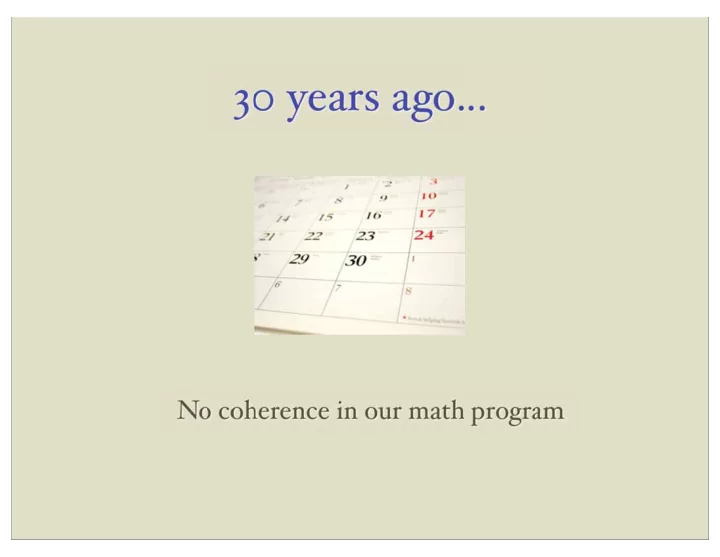

Teacher Collaboration Professional Development from the Inside Jonathan Howland Henri Picciotto The Urban School of San Francisco
Teacher Collaboration An Archetype Rationale Theory Practice Benefits Challenges An Alternate Archetype
Collaboration is concerned with teaching and learning • Content • Lesson plans • Learning activities • Assessments • Curriculum design • Evaluation and revision of program
Collaboration addresses any and all pedagogical and curricular issues • It is designed to support ordinarily configured classroom teaching • It is particularly important for the core subject matter – It is foundational – It should express the program’s principal aims – Most time, biggest impact
Collaboration supports the professional growth of the participants • Provides opportunities to express doubts and concerns • Allows a teacher to compensate for weaknesses and share strengths • Expands a teacher’s range and repertoire
Collaboration strengthens departmental programs • Problems, missed opportunities, and alternate strategies are openly explored • Expanded proprietorship of the program for each of its members • Greater coherence
Teacher collaboration ultimately benefits the student • It may address the needs of specific types of learners • However, it is not focused on the needs of individual students � (Our schools have many venues for those discussions)
Teacher Collaboration An Archetype Rationale Theory Practice Benefits Challenges An Alternate Archetype
Various Configurations All of them consisting of teachers from the same department / division working in small teams
1. Same class, different sections • Weekly meetings • Frequent informal exchanges • E-mail conference
2. Out-and-out Mentoring Collaboration between an experienced teacher who is or is not teaching a course, and less experienced teachers who are.
3. Different Courses / Grades • More difficult • Less-than-weekly meetings • Requires more thoughtful leadership and planning
4. Summer Work • Concentrated endeavor, three days to two weeks • Paid • Curriculum design and redesign � (prioritize!) • Overall articulation of the program • Documentation of the curriculum � (Big picture to actual worksheets)
5. Presentations at Professional Conferences • A way to share the fruits of the day-to-day collaboration with the broader education community • (In ten years, dramatic increase in the number of presentations by Urban teachers.)
Leadership • Veteran teacher and/or mentor collaborates with a less experienced colleague • In a two-person collaboration of peers, who leads is moot • In other circumstances, the main responsibility of the leader is to – Organize / solicit the agenda – Keep a record of the team’s work
Teacher Collaboration An Archetype Rationale Theory Practice Benefits Challenges An Alternate Archetype
Challenge and Renewal • One does learn from experience, but unexamined experience can be of limited value • Teachers cannot learn all they need to know about their practice from interactions with students
A Strong Program Gets Better • Good ideas spread to other classes and teachers � (In the absence of collaboration, many good ideas leave the school with their originator) • “Philosophy” is discussed in the context of the actual work we do
Course Corrections • Collaboration facilitates necessary curricular change, and the archiving and refining of good material. • Flaws in the program are more likely to be challenged • Nuances, details, and subtleties are attended to
Effective Mentoring • Younger teachers learn the tools of the trade • Over time, they are offered a richer menu of models than in the standard one-mentor approach � On a more practical level, collaboration helps reduce the beginner’s workload.
Mentoring — other effects • Veterans gain energy, new ideas from their work with less experienced colleagues • New teachers learn that even experienced teachers face challenges and difficulties in the reality of the classroom • In the collaboration, they are trusted and respected as peers, an invaluable boost to their confidence
Faculty Bonding • Collaboration meetings address the everyday needs of teachers • There is no better way to build esprit de corps • This solidarity pays off in enthusiasm and commitment to the program
Teacher Collaboration An Archetype Rationale Theory Practice Benefits Challenges An Alternate Archetype
Obstacles • Teacher collaboration requires a change in outlook, not merely a change in policy • Scheduling and time issues
Points of Tension • Generalist v. specialist • Curriculum ownership by the teacher v. the needs of the common program • Manners — kindness and support in the context of critical discourse • Patience
The Teacher’s Voice Is collaboration homogenizing? • Idiosyncrasy remains important — celebrate teacher quirkiness within common enterprise • This is not unlike what we expect of students: strive for common goals, but strive distinctly
One High School Implication � This approach calls for and facilitates the practice of having all teachers working in the core curriculum. � (This may conflict with established habits, structures and expectations.) �
Musical Chairs • Content expertise and pedagogical savvy are assets • But the feudal order is a liability • A solution: – Experienced faculty share teaching the core – Less experienced faculty grow into more advanced (“plum”) courses – And everyone, all along, collaborates in the work of teaching and design
Teacher Collaboration Independent School Magazine , Spring ‘03 “Into the Province of Shared Endeavor” Jonathan Howland jhowland@urbanschool.org Henri Picciotto hpicciotto@urbanschool.org The Urban School of San Francisco
SUMMER 2012 WORKSHOPS FOR MIDDLE AND HIGH SCHOOL EDUCATORS AND EDUCATIONAL LEADERS SAN FRANCISCO NEW YORK, NY The Urban School The Chapin School June 18-22 August 13-17
Recommend
More recommend